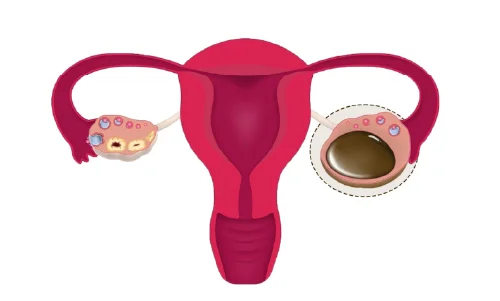Endometrial cysts, also known as ovarian endometriomas or chocolate cysts, can cause significant discomfort and may lead to complications if left untreated. These cysts result from endometriosis, a condition where tissue similar to the lining inside the uterus (endometrium) grows outside the uterus. For expert diagnosis and treatment of endometrial cysts, consult with the top gynecologists at CK Birla Hospital in Gurgaon.
Endometrial cysts form when endometrial tissue attaches to an ovary and creates a fluid-filled sac. This can lead to severe pelvic pain, irregular menstrual cycles, and fertility issues. Timely and proper treatment is essential to manage symptoms and prevent complications. Treatment options range from medication to surgical intervention, depending on the size and severity of the cysts and the patient's symptoms.

| Aspect | Minimally Invasive Surgery | Traditional Open Surgery |
| Incisions | Smaller incisions | Larger incisions |
| Recovery Time | Shorter recovery period | Longer recovery period |
| Pain and Scarring | Less pain and minimal scarring | More pain and noticeable scarring |
| Hospital Stay | Shorter hospital stay | Longer hospital stay |
| Infection Risk | Reduced risk of infection | Higher risk of infection |
Recovery time varies based on the type of surgery. Minimally invasive procedures like laparoscopy typically require 1-2 weeks for initial recovery, while open surgery may take 4-6 weeks.
Yes, endometrial cysts can recur even after treatment. Long-term management, including hormonal therapy and regular monitoring, is often necessary to reduce the risk of recurrence.
Yes, non-surgical treatments include hormonal therapies such as birth control pills, GnRH agonists, and progestins to manage symptoms and reduce cyst size. Pain management with NSAIDs is also commonly used.
Most health insurance plans cover endometrial cyst treatment, including surgery and medication. It is important to check with your insurance provider for specific coverage details and any potential out-of-pocket costs.
Signs of a ruptured endometrial cyst include sudden, severe pelvic pain, abdominal tenderness, nausea, vomiting, and sometimes fainting or dizziness. Seek immediate medical attention if you experience these symptoms.
Yes, endometrial cysts can affect fertility and pregnancy. They can interfere with ovarian function and the normal anatomy of the reproductive organs. Treatment can improve fertility outcomes, and it is essential to discuss family planning with your gynecologist.